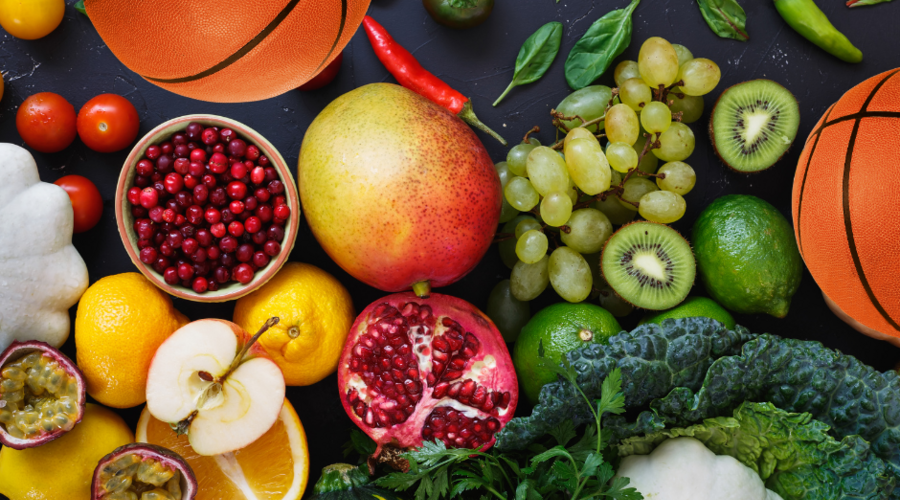Fueling Your Game: How Nutrition Shapes Basketball Performance

Basketball isn’t just about skill—your body is the engine, and nutrition is the fuel. You can train all day, perfect your shot, sharpen your footwork, but if your diet is off, you’ll never hit your peak. Energy fades, muscles break down, and recovery drags. The best players? They treat their nutrition as seriously as their practice.
Let’s break it down. What should you be eating to stay sharp, recover faster, and outlast the competition?
The Fuel That Keeps You Moving
1. Energy on Demand
Basketball is non-stop—sprinting, cutting, jumping, defending. Your body burns through energy fast. Where does it come from? Carbs. Not just any carbs—the right ones. Think whole grains, fruits, vegetables. They release energy steadily, keeping you going through all four quarters. Junk food? It spikes, crashes, and leaves you gassed when you need it most.
2. Muscle Repair & Strength
You push your body hard. Muscles tear, rebuild, and get stronger—if they have the right fuel. That’s where protein comes in. Chicken, fish, eggs, dairy, beans, nuts. After a game or practice, your muscles are screaming for it. Skip protein, and you’re not just sore—you’re setting yourself up for slower recovery and weaker performance.
3. Hydration: The Silent Game-Changer
Miss a few shots? Losing focus? Feeling sluggish? You might not be tired—you might just be dehydrated. Even 2% dehydration can mess with coordination, reaction time, and decision-making. Water is the foundation. Sports drinks? They have their place, but don’t lean on them unless you’re sweating buckets or playing back-to-back games.
What’s On Your Plate?
The Must-Have Nutrients
- Carbs – Your main energy source. Oats, rice, quinoa, whole wheat pasta.
- Protein – Repairs and builds muscle. Lean meats, fish, eggs, legumes.
- Fats – Supports endurance and brain function. Avocados, nuts, olive oil, fatty fish.
- Vitamins & Minerals – The behind-the-scenes crew. They keep your muscles firing, bones strong, and energy levels high. Pay attention to Vitamin D, B vitamins, calcium, iron, magnesium.
Eat Like an Athlete
Before the Game: The Warm-Up Meal
- 3-4 hours before tip-off – Load up on carbs with a bit of protein. Grilled chicken with rice, a turkey sandwich, or oatmeal with fruit.
- No greasy, heavy food – It’ll sit in your stomach and slow you down.
During the Game: Quick Energy
- Water first. Stay ahead of dehydration—don’t wait until you’re thirsty.
- Need a boost? Grab a banana, an energy bar, or some dried fruit. Simple, quick carbs keep you running.
Post-Game: The Recovery Window
- First two hours = prime time for muscle repair. Get protein + carbs in fast. A protein shake, grilled salmon with quinoa, or eggs with whole-grain toast.
- Reduce inflammation. Berries, turmeric, nuts, and fatty fish help cut down soreness and speed up recovery.
Everyday Nutrition: Build Good Habits
- Mix it up—don’t eat the same thing every day.
- Match portion sizes to training intensity.
- Plan ahead so you're not grabbing junk when you're starving.
Supplements? Maybe. But Don’t Rely on Them.
Supplements aren’t magic. If your base diet is trash, no powder or pill will fix it. Yes, protein shakes can help. Yes, some athletes need extra vitamins. But before you pop anything, talk to a pro. Some supplements are contaminated, and sports organizations have strict regulations. Don't take risks that could cost you your eligibility.
If you’re serious about getting the right nutrition plan, connect with a coach who knows what they’re doing. We’ve got some of the best trainers available—find one near you and get a plan that actually works.
The Bottom Line
Basketball isn’t just played on the court—it’s built in the kitchen. The best players don’t just train hard; they eat smart. The right food fuels every sprint, every jump, every shot. Mess it up, and you’ll feel it. Get it right, and you’ll run harder, jump higher, recover faster, and play longer. Try our nutrition plans in the basketball training app.
Your body does the work. Your diet sets the limit. Which one are you choosing?
Related Articles:

Aiming High: Enhancing Shooting Accuracy with Targeted Focus in Basketball
One of the most fundamental yet often overlooked aspects of improving shooting accuracy is the concept of keeping your eyes on the target. This article delves into the essence of this technique and how it can transform your gameplay.


